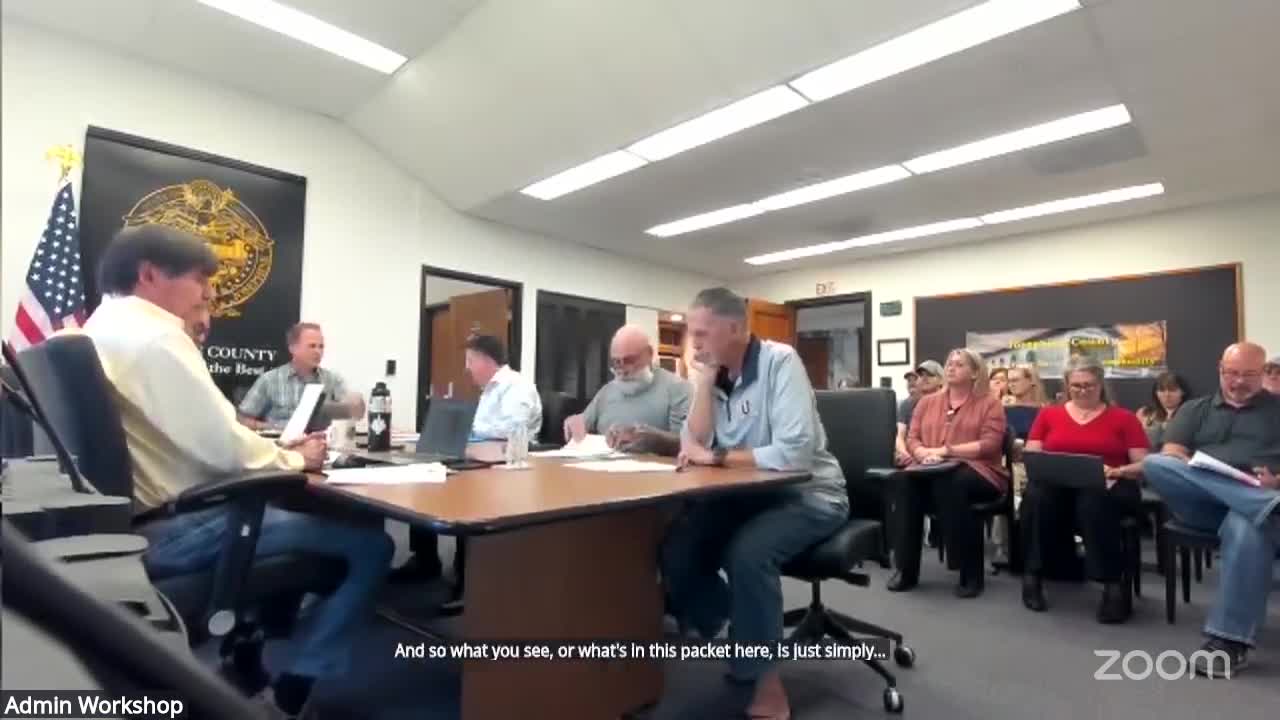Nonprofit presenters ask Josephine County to consider leased site at 1798 SE N Street for 24/7 managed stabilization center
Get AI-powered insights, summaries, and transcripts
Subscribe
Summary
Presenters representing local nonprofits and faith-based recovery programs asked the Josephine County Board of Commissioners on Oct. 14 to consider leasing county‑owned property at 1798 SE N Street in Grants Pass for a 24‑hour managed stabilization center, intended as an alternative to unmanaged downtown encampments.
Presenters representing local nonprofits and faith-based recovery programs asked the Josephine County Board of Commissioners on Oct. 14 to consider leasing county-owned property at 1798 SE N Street in Grants Pass for a 24-hour managed stabilization center, intended as an alternative to unmanaged downtown encampments.
The presenters said the proposed site would be fenced, lit and staffed 24/7; would use modular units (not tents); and would include screening, behavior agreements for participants, coordinated case management, links to addiction and mental-health services, and monthly community advisory meetings for neighbors. They said the project would aim to move people into treatment and housing rather than maintain encampments.
The proposal’s supporters described an initial budget figure of about $3,000,000 to launch the site, said a city grant of about $1,200,000 was identified as one near-term revenue source, and said additional state, federal and private funding partners were expected to be pursued. Presenters named several models and partners by example, including Community Solutions, Built for Zero, Road’s Retreat and U-Turn for Christ, and said lessons from those programs informed their plans.
Why it matters: presenters argued a managed stabilization center would offer a safer, cleaner and service‑rich option than unsanctioned encampments; they said law enforcement could divert people to the center rather than pursue arrests, and that the availability of a reasonable alternative could allow the city to begin closing unmanaged camps under obligations described by the presenters as flowing from a Disability Rights Oregon settlement.
What the board and staff said: Commissioners raised zoning, proximity to schools and apartments, community acceptance and timing. Commissioner Smith said she personally disliked the location because it is “within a half a block of an elementary school” and across from a large apartment complex; other commissioners and staff noted the site is in a Business Park/Industrial zone and that a conditional use permit would likely be required rather than rezoning. Staff reported preliminary conversations with city planning and noted a formal development permit and additional city reviews would be required.
Community concerns and proposed mitigation: presenters said the entrance could be relocated away from adjacent residences, that the site would employ controlled access, security and a hotline for neighbors, and that an exclusion zone would be enforced to prohibit loitering or camping by nonparticipants. They proposed a community advisory council and regular community meetings to increase transparency and neighbor confidence.
Process next steps: the board did not take formal action on leasing or contracting. Commissioners and staff agreed to hold a public meeting or community forum on the proposal; staff were directed to identify an appropriate venue (county fairgrounds was mentioned) and coordinate a date and logistics for a community workshop. Presenters requested a letter of intent as an early step; staff said any lease or contract would require later, separate approvals and the city’s permits. The board and presenters repeatedly emphasized the discussion was informational only and that no lease or contract had been executed.
Budget and timeline claimed by presenters: presenters said the initial startup cost was approximately $3,000,000; they described a funding mix of a $1.2 million city grant plus other state, federal and private match commitments (some pledges were described as oral, not formalized). A tentative timeline offered in the meeting materials projected site preparation and improvements in December 2025 if grants were awarded and approvals obtained, with a potential early-2026 opening and capacity for about 150 individuals if all funding and approvals proceeded as planned.
Speakers and attribution: direct quotes are from those on the record at the meeting. The presenters repeatedly described the proposal as “managed,” “24/7” and “not a tent encampment,” and said the model would emphasize “case management” and accountability. Joy Renner, a member of the public, spoke during comments and described a recent personal loss to drug overdose while urging action.
What’s unresolved: community support remains uncertain; formal permits and conditional use approvals with the city are outstanding; funding commitments beyond the city grant were described as potential or dependent on an initial award; and the board has not authorized any lease, expenditure or contract. The board asked staff to schedule a public forum to solicit neighbor input before any formal decision.
Ending: The discussion will continue at a public forum to be scheduled by staff; presenters and staff said they will share additional site renderings, zoning analysis and grant-status updates before the board considers any lease or binding agreement.
